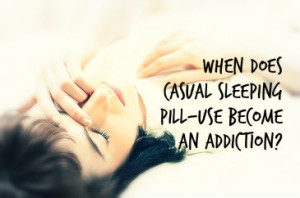Article Contributed By American Addiction Centers Staff
 For many Americans across the nation, getting adequate and restful sleep is not as commonplace as it should be.
For many Americans across the nation, getting adequate and restful sleep is not as commonplace as it should be.
According to the National Sleep Foundation, as many as 47 million adults may be putting themselves at risk for injury, health, and behavioral problems because they are not meeting their minimum sleep needs in order to be fully alert the next day.
Understanding Insomnia
Insomnia, or the inability to fall asleep or to stay asleep as long as desired, is one of the most common sleep complaints among Americans. The National Center for Sleep Disorders Research at the National Institute of Health has reported that 30-40% of adults have some symptoms of insomnia within a given year, with about 10-15% of adults reporting chronic insomnia [1].
Insomnia can be characterized as a symptom of medical or psychiatric disorders or as a primary sleep disorder. Many factors can influence the development of insomnia, including:
- Emotional/psychological stress
- A history of mental health disorders (including depression or anxiety)
- Erratic work schedules
- Jet lag from traveling
- Marital or relationship discord
- Loss of a loved one
- Financial pressures
- High-stress lifestyle
Insomnia and Sleeping Pills
Many individuals who suffer with insomnia may commonly turn to sleeping pills to induce and/or maintain sleep. While sleeping pills may be helpful in solving short-term sleeping difficulties, long term use of these powerful medications could lead to misuse or addiction. Most sleeping pills function as “sedative hypnotics” and can be broken down into the following classes:
- Benzodiazepines: These sedative hypnotics also function as anti-anxiety medications and include drugs such as Xanax, Ativan, Valium, and Librium. These class of drugs help induce sleep by increasing drowsiness. Benzodiazepine drugs can be potentially addictive.
- Barbiturates: These sedative hypnotic drugs function by depressing the central nervous system, causing sedation. These types of medications are regularly used for anesthesia, though can be prescribed as sleeping pills.
- Non-habit forming: These newer types of sleeping medications induce sleep by increasing drowsiness. Medications that fall in this class include Lunesta, Ambien, and Sonata. These drugs can help reduce the time it takes to fall asleep while being non-habit forming.
Side Effects of Sleeping Pills
As with all medications, sleeping pills may cause side effects, such as changes in appetite, unusual dreams, gastrointestinal distress, tremors or shakes, prolonged drowsiness, hallucinations and more. The potential danger of sleeping pills lies in misuse, as dependency or addiction to these medications can occur if used for extended periods of time.
Some sleeping pill medications, such as Ambien, may be used recreationally to achieve a “high”. Misuse of sleeping pills, beyond what is recommended and prescribed by a physician, may lead to an addiction, which can result in devastating physical, emotional, social, and financial consequences.
What to Do When Casual Sleeping Pill Use Becomes and Addiction
If you or a loved one is abusing sleeping pills, it is important to seek professional help to overcome this issue as an addiction can be developed. Treating an addiction to sleeping pills will help address the underlying issue that may have influenced insomnia in the first place, such as a pre-existing mental health disorder or psychological condition.
Be aware of the following signs, which may indicate an addiction to sleeping pills has developed:
- Chronic use of sleeping pills, beyond what is prescribed by a physician
- Taking a higher dosage of medication than what is prescribed
- Use of sleeping pills to “numb” or escape overwhelming situations or emotions
- Combining sleeping pills with other medications, illegal drugs, or alcohol
- Withdrawal symptoms with absence of drug, such as vomiting, seizures, panic attacks, or tremors
The Importance of a Regular Sleep Cycle
Establishing a regular and sufficient sleeping cycle is important for the normal, healthy function of every individual. While insomnia can be a problematic disorder to live with, there are solutions that can address these concerns. Sleeping pills can be effective if used appropriately and under the direction of a physician and pharmacist.
If you are using sleeping pills beyond what is advisable by a medical professional, take the opportunity to seek the help you need today. Life is not meant to live in a sedated state; help is available to assist you in overcoming an addiction to sleeping pills.
References:
[1]: The National Sleep Foundation. “Insomnia and Sleep”. http://sleepfoundation.org/sleep-disorders-problems/insomnia-and-sleep Accessed 15 March 2014.
Last Updated & Reviewed By: Jacquelyn Ekern, MS, LPC on March 18, 2014
Published on AddictionHope.com, Help Online for Addictions
